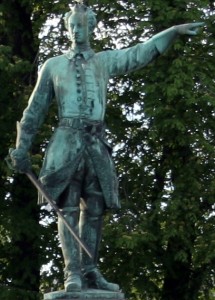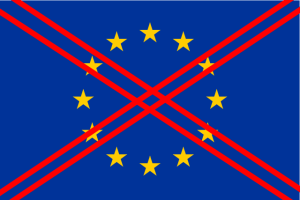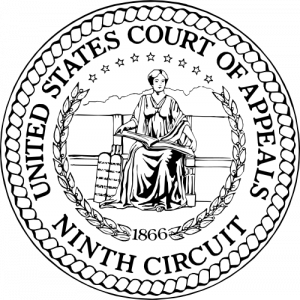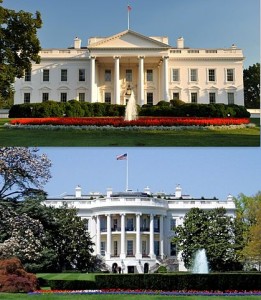
That is a photograph of the very demonstrative State Senator Mike Doherty, whose address to the Paul faithful was interrupted by the man everyone had come to Philadelphia to see, accompanied-as always-by his charming wife, Carol. Senator Doherty was the penultimate speaker in a stable of high profile Paul supporters who took the stage across from Independence Hall in order to exhort the crowd to action.
Although the scheduled speakers comprised the main portion of Philadelphia Phreedom, there was also entertainment, food, canvassing, and-as should be expected at any libertarian event-commerce. Perhaps the most fascinating aspect of yesterday’s festivities was the surprising number of vendors selling freedom-oriented apparel and music. Ironically, libertarianism and free market economics are not normally associated with mass market fashion and popular culture. An observation that anyone who’s spotted a t-shirt idolizing dreary socialist demagogue and mass executioner Che Guevara will keenly appreciate. However, there were a host of booths shopping their wares on the lawn of Independence Hall, above and beyond the usual selection of Gadsden flags and buttons from the now defunct Bureaucrash.
There was a merch table for Tatiana Moroz-who is seen below performing below with Jordan Page-a musician who’s performed at numerous Ron Paul campaign events over the past year. The two belted out a rendition of Message of Freedom, a song that has one of the best refrains of any explicitly political folk-rock anthem I’ve heard this year.
…’cause freedom’s the answer; what is the question? Resist the advances of force and aggression.

There were also people who, in the spirit of agorism, sold rain ponchos in exchange for silver. Or, as our historical antecedents called it, money.

Aside from the makeshift Ron Paul threads, there were freedom-loving merchants with well-designed summer clothing for sale, which will probably be useful in a couple of weeks.

As well as a local, artisanal bakery that provided free danishes and muffins to the wet, weary troops of the Ron Paul revolution. Although I didn’t partake, I was told they were delicious.

And since Ron Paul supports the decriminalization of many things, some in the crowd took the opportunity to bring their own gigantic, inflatable hempzels. Although those, as far as I know, were not for sale.

One of my favorite booths though was manned by a family that stood up to the government’s War on Lemonade.

The opening volley in their counterattack for freedom was launched by this adorable little girl, who was selling ice-cold glasses of the forbidden drink for two dollars a pop.

No doubt directed to do so by Robert Fernandes, the man who’s resisted the state’s attempt to squelch young entrepreneurism by shutting down lemonade stands that defy government edicts.

The past is never dead. It’s not even past. Mr. Fernandes reminded me of this maxim by his own choice of apparel. Lysander Spooner was an anarchist philosopher, abolitionist, and someone who confronted state monopolies in his day, anachronistic government agencies which, unfortunately, still plague us.

In addition to military veterans who traveled to Philadelphia, there were others who chose to highlight a specific issue that drew them to this rally. The lemonade scofflaw, for example, turns out to have parents who educated her themselves, as impossible as that task might be for some people to believe. Considering the strong support Ron Paul enjoys among home schoolers, it didn’t surprise me that there were parents of home schooled children in the crowd.

Neither did the number of young people I saw at the event.

Resistance to tyranny was a recurring theme throughout the day, in keeping with the backdrop for Philadelphia Phreedom.

The Oathkeepers are an organization created by members of the Armed Forces and law enforcement officials who vow not to enforce laws that are unconstitutional .

Such as the National Defense Authorization Act for Fiscal Year 2012

Some Paul supporters chose to highlight Dr. Paul’s work as an obstetrician-gynecologist, which preceded his political career.

Still others used the incredibly inhospitable weather to tout Rep. Paul’s sunshine remedy. Later on, Paul would play upon the revolutionary theme of this gathering by congratulating his supporters on their persistence in spite of the storm, paraphrasing Thomas Paine’s words from The American Crisis about sunshine patriots and winter soldiers.

Even Bruce Springsteen, of all people, reinforced the overriding message of the day:

Campaign for Liberty had one of the largest contingents at the rally, which seems appropriate, given that it is an organization founded by Ron Paul.

The need to continue the mission of the Paul presidential campaign after this election, regardless of the results, was a theme echoed by James Padilioni, a Campus Coordinator and executive board member of Students for Liberty pursuing a degree in history at West Chester University of Pennsylvania. The imperative for the Ron Paul movement to transition into a sustained political machine rolling back the state’s abuses-and here he citied specific repudiations of Constitutional law such as the NDAA and undeclared wars-was the central theme of his address.

Even so, the importance of direct political involvement was not downplayed, as the outpost established by Marc Scaringi, a candidate running for the right to challenge Senator Bob Casey Jr., proved.

Pennsylvania state senator Mike Folmer made an impassioned plea to support his candidate at the beginning of the speaking portion of the event. He used his own improbable political victory as an example of the extreme frustration and discontent felt by the electorate. And it is true that there is an entire slate of candidates running for national, statewide, and municipal office who espouse the same ideals of Ron Paul, collectively labeled liberty candidates.

The emcee of the event, Mike Salvi, was somehow able to entertain the crowd for the duration of the event, even as the rain cascaded over every part of their bodies while they waited for the keynote speaker to arrive.

One of the failures was, unfortunately, the foreign policy/national security portion of the speaker’s roster. What should have been a simple exposition of Ron Paul’s main foreign policy planks, which can be boiled down to a handful of clearly delineated bullet points:
-We can’t afford to police the world; it’s ultimately unsustainable and counterproductive to our security interests, not least because we’re functionally bankrupt.
-We should trade with other nations, not subsidize their governments.
-War should be a last resort, and only used as a defensive response to foreign aggression against America itself.
was somehow turned into a plodding, leaden speech which consisted chiefly of attacking Michael Scheuer’s perceived enemies, evangelical Christians and Commentary Magazine, among others, and an extensive digression about the conflict between newly independent South Sudan and Sudan which included a lengthy accusation that the former was trying to “paganize” devout Muslims.
Leaving aside its bizarre religious elements, the main problem I had with Scheuer’s speech was that it ascribed complete responsibility for our government’s foreign and defense shortcomings to Capitol Hill lobbyists for foreign nations-which are abundant in Washington D.C.-but almost none to the voters who elected the people who are ostensibly in thrall to these foreign interests. If President Obama is stupid-to paraphrase a quote from Senator Charles Grassley Scheuer repeated during his speech-then what does that make the people who elected him to the presidency of the United States? Even though lobbyists exercise an inordinate influence over policy-making decisions in Washington D.C., to minimize the involvement of the electorate in the decisions undertaken by the people they elect to office is missing the point.

Someone who was on point-even if a bit tired after months of cross-country campaigning-was the featured speaker of Philly Phreedom, Republican presidential candidate Ron Paul.

Even though there weren’t many parts of his speech that hadn’t been incorporated into past talks-either during presidential debates or on the stump-the fact that he was able to keep the rapt attention of hundreds of supporters for the better part of hour enunciating points that they were all aware of-and had probably heard repeated many times in the past-is itself a testament to the resonance of his ideas among a large part of this country’s politically engaged citizens. Whether the appeal of Paul’s message can be translated into a permanent oppositional party, or effect change in the subordinate relationship the individual currently enjoys with the state, remains to be seen. However, if we do go the way of Greece, this might simply become an academic discussion.
Bartering, anyone?







Recent Comments